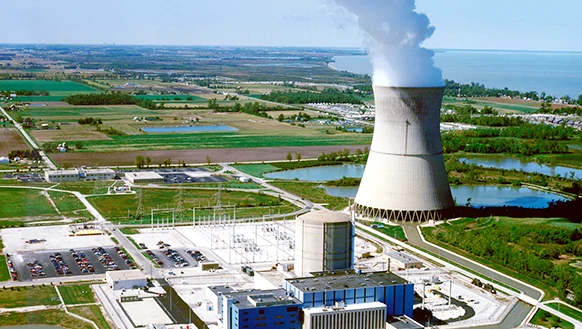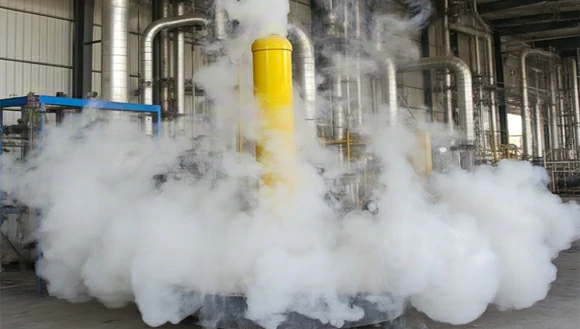Huiya Envirotech’s expertise ensures optimal application of Chlorine Dioxide’s strong oxidizing and broad-spectrum antimicrobial properties, maintaining clean, safe, and efficient power plant systems while upholding stringent environmental standards. Our commitment to innovative water treatment solutions helps power plants operate reliably and sustainably, delivering superior performance in water and gas management processes.
Sodium chlorite and chlorine dioxide are essential for efficient water treatment in the power industry. These compounds are used in cooling water treatment to control biofouling and legionella, wastewater treatment for disinfection and odor control, and flue gas treatment for NOx and cyanide removal. Chlorine dioxide’s powerful oxidizing properties help maintain system efficiency, safety, and environmental compliance.
In the power industry, effective flue gas treatment is critical for controlling air pollution and meeting environmental regulations. Our solutions leverage sodium chlorite (NaClO2) as a precursor for the on-site generation of chlorine dioxide (ClO2)], a powerful oxidative agent, for the removal of key pollutants like nitrogen oxides (NOx) and cyanides. This comprehensive approach to flue gas treatment also contributes to desulfurization and denitration efforts by addressing common gaseous contaminants.
01 / 02


Nitrogen oxides are significant air pollutants contributing to smog, acid rain, and particulate matter. Chlorine dioxide can be effectively used to oxidize nitrogen oxides in flue gases. This process typically involves injecting chlorine dioxide into the flue gas stream, where it reacts with NOx to form NO2, which can then be further treated or removed. ClO2 also oxidizes NOx into higher oxidation states (e.g., N2O5), facilitating their capture and removal by wet scrubbers and other abatement technologies. This is a key aspect of denitration in flue gas treatment.
Cyanides can be present in flue gases, particularly in power plants burning coal that contains trace nitrogen-based compounds. Chlorine dioxide is a highly effective agent for oxidizing cyanides into less toxic substances such as cyanates, which are more stable and less harmful.
This oxidation process can be catalyzed by the presence of certain metal oxides in flue gas treatment systems, which help to break down cyanides more efficiently at lower temperatures, reducing both chemical costs and energy consumption.
Flue gases from power plants often contain odorous compounds, including hydrogen sulfide (H₂S), mercaptans, and ammonia. These unpleasant odors can be effectively neutralized using chlorine dioxide. By oxidizing and breaking down these Odor-causing compounds, ClO₂ helps to reduce or eliminate foul smells, improving air quality within the plant environment.
02 / 02


1. Selective Oxidation: ClO2 selectively targets pollutants like NOx and cyanides without reacting as readily with other flue gas components.
2. Effective at Lower Concentrations: Its effectiveness at lower concentrations can reduce chemical costs and minimize unwanted side reactions.
3. Operational Flexibility: Chlorine dioxide can be generated on-site and precisely injected, allowing for responsive operation based on real-time emissions monitoring.
4. Versatile Application Methods: Sodium chlorite solutions can be applied via direct injection, misting, spraying, or circulation in wastewater treatment systems, depending on specific odor sources and environmental conditions.
In the context of flue gas treatment, sodium chlorite and chlorine dioxide provide powerful solutions for controlling NOx emissions, detoxifying cyanides, and neutralizing odors in power plant exhaust systems. By utilizing chlorine dioxide's oxidative properties, industrial facilities can meet stringent environmental standards, reduce their impact on air quality, and improve public health.
These applications are crucial in ensuring desulfurization, denitration, and the overall reduction of harmful pollutants from flue gases, contributing to a cleaner, safer environment.
Get top-quality sodium chlorite and chlorine dioxide products, along with custom solutions. Our expert team is here to help - contact us today!
Contact Us